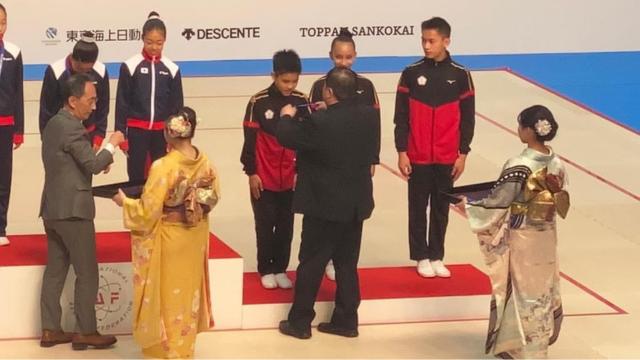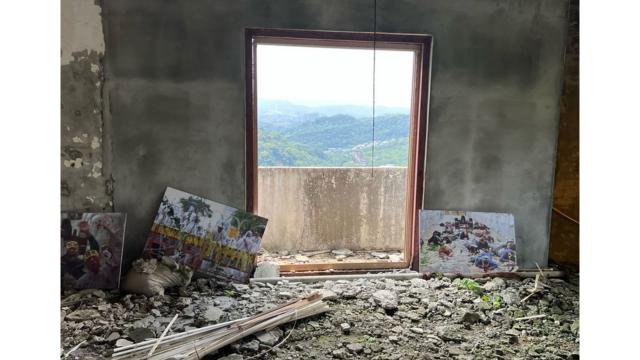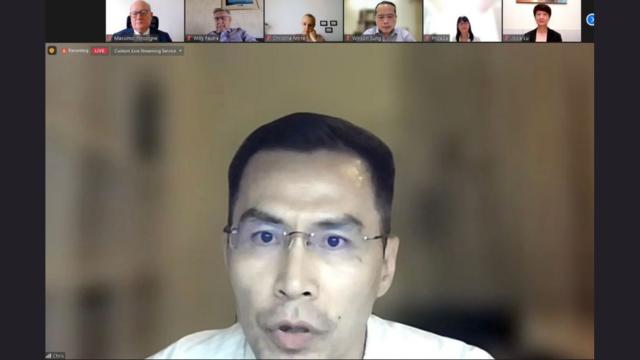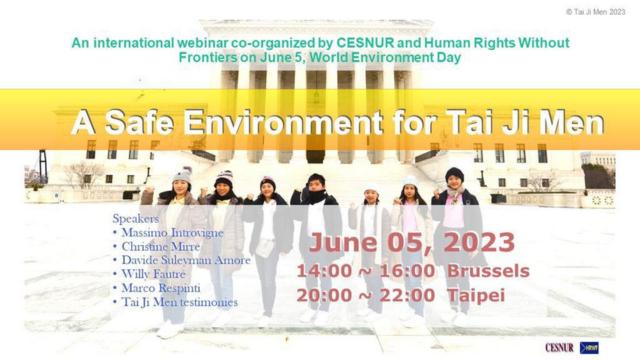On World Environment Day, scholars and human rights activists celebrated Dr. Hong’s pro-environment achievements and discussed the Tai Ji Men case.
by Alessandro Amicarelli

On June 5, 2023, United Nations World Environment Day, CESNUR and the Brussels-based NGO Human Rights Without Frontiers co-organized one of their bi-monthly international webinars, on the theme “A Safe Environment for Tai Ji Men.”
Massimo Introvigne, managing director of CESNUR and the editor-in-chief of “Bitter Winter,” introduced the webinar by comparing a masterpiece of contemporary art, the installation “Fu Dao” by the late Chinese-French artist Chen Zhen, and the speech given by Dr. Hong Tao-Tze, the Shifu (Grand Master) of Tai Ji Men, at the 65th Annual United Nations DPI/NGO conference in 2014.
Chen Zhen’s work consists of a pagoda-like structure of real bamboo wood and leaves. Hung on it are at the first level wastes from our consumerist society, and at the second level Buddha statues turned upside-down (one of the possible meanings of “Fu Dao” in Chinese is “Buddha upside-down”). The message of “Fu Dao” and Dr. Hong’s 2014 speech, Introvigne said, are similar. Both denounce the risk that materialism and pollution may destroy our physical and spiritual environment. Both express a hope that the planet can still be saved, Introvigne added, but Dr. Hong indicates a practical solution: change the hearts and return to conscience, which also implies restoring justice and solving long-lasting problems of injustice such as the Tai Ji Men case.

Introvigne presented a video with a message for the World Environment Day from United Nations Secretary General António Guterres, devoted to the tragedy of plastic pollution. Every day, Guterres said, the equivalent of 2,000 trucks of plastic is dumped in oceans, seas, rivers, and lakes. The good news, however, Guterres added, is that the situation is not irreversible. Several countries have already achieved significant results in reducing their addiction to plastic.
Introvigne then introduced the first two speakers, Christine Mirre, deputy director of the United Nations ECOSOC-accredited NGO Coordination des associations et des particuliers pour la liberté de conscience (CAP-LC), and Davide Suleyman Amore, a lecturer in history and philosophy who is the secretary of the Italian Islamic association as-Salàm.
Mirre recalled her participation in the April 2023 visit of a delegation of scholars and human rights activists to Taiwan, to attend seminars in different universities and visit local authorities. Mirre expressed her admiration for Taiwan’s better record of protecting human rights and freedom of religion or belief compared to its Asian neighbors and even to some European countries. On the other hand, she noted that there are exceptions and relics of Taiwan’s dark authoritarian past.
Mirre mentioned the paradox of Tai Ji Men. The movement has been praised by several Presidents of Taiwan for its activities on behalf of world peace and the protection of the environment, and for acting as an ambassador of Taiwanese culture through the events and performances it has brought to more than one hundred countries of the world. Tai Ji Men dizi (disciples) also won international sport competitions. Few months ago, for example, a young dizi won the bronze medal at the Suzuki World Cup 2023 of gymnastic in Japan.

On the other hand, Tai Ji Men continued to be harassed and persecuted at home through ill-founded tax bills. Despite his clear and proved violations of the law, Prosecutor Hou Kuan-Jen, the man most responsible for the persecution of Tai Ji Men, has not been sanctioned and keeps being promoted. Recently, Mirre said, he is actively promoting the National Institute of Judicial Science and may even become its director.
Amore discussed the conflict between the modern states, which try to control and regulate everything, and communities that assert their independence, autonomy, and right to think independently. Amore mentioned the case of the Swiss Mountain Villa, bought in 1995 by Dr. Hong and destined to be a large event venue and a learning center for Tai Ji Men, with facilities for hosting overseas dizi when they come to Taiwan. From 1997 to 2020, the property has been first frozen then used as a collateral in the fabricated tax case against Tai Ji Men. Only in 2020 was the Swiss Mountain Villa finally returned by Dr. Hong. By then, because of the problems that lasted for more than 23 years, the property was in a sad state of abandonment.
Amore compared the Swiss Mountain Villa story, the different proportions considered, to the events that led Medina to become a holy city of Islam. In both cases, believers affirmed their rights to create spaces where they could enjoy a safe environment, and clashed with hostile powers. The story of the Swiss Mountain Villa, Amore concluded, can still end well, within the framework of a possible general settlement and rectification of the Tai Ji Men case.

Willy Fautré, co-founder and director of Human Rights Without Frontiers, introduced the second session, which opened with a moving video where victims of tax injustice in Taiwan and their relatives shared their dramatic experiences. Fautré underlined the main theme of the webinar: a forceful statement that, as there is physical pollution, there is also the moral pollution of corruption and injustice. A safe environment, he said, is one where citizens are both protected from physical pollution and from the kind of injustice that has hit Tai Ji Men for decades.
The full video of the webinar.
Fautré then introduced the testimonies of five dizi. Winson Sung, who works as product manager in a semiconductor company, returned to the theme of plastic pollution. He noted that every minute one million of plastic bottles are purchased in the world, and only ten percent of them will eventually be recycled. Sung shared his professional experience in the International Semiconductor Industry Association, which each year on June 5 reflects on the best practices to contain pollution in its field. Sung also shared his experience as a dizi, who learned from Dr. Hong that technology will not ultimately solve the problems of the environment, without a change of heart and a return to conscience. Sung traveled with Dr. Hong to eleven different countries to spread this message. He also expressed his agreement with Professor Introvigne who repeatedly said, including during the Taiwan visit of April 2023, that the problems of the physical environment will never be solved without solving at the same time the problems of moral environment and fighting corruption and injustice, of which the Tai Ji Men case is an egregious example.
Chris Hsu, an optical engineer, stated that the dramatic situation of the environment is discussed often at all levels, yet rarely are persuasive solutions offered. When he became a Tai Ji Men dizi, he learned that even the most dramatic problems may be solved if humans would return to the primacy of conscience. He learned at the same time how to cope with the stress of his demanding work. His mother, who had health issues, also joined Tai Ji Men and solved them through the practice of qigong. Hsu agreed with other speakers in underlining the paradox that such a benevolent organization has been persecuted through unfounded tax bills for more than 26 years.

Elly Chang, an executive in a semiconductor company, mentioned the impact of climate change in Taiwan. She noted that the world is admiring the achievement of the semiconductor industry in Taiwan. Yet, it is an energy-intensive industry that consumes significant amounts of water and electricity, commodities that are at risk of becoming scarce in Taiwan. As a dizi, she is aware that company executives as well should be guided by conscience. This is also true for government bureaucrats, she concluded, who unfortunately constantly showed their lack of conscience when dealing with the Tai Ji Men case.
Phoebe Pan, a foundation counselor providing guidance for inclusive education and a tax reform volunteer, reported about the benefits she derived from practicing qigong with Tai Ji Men, which allowed her to overcome a severe case of rheumatoid arthritis. She also mentioned the issue of plastic pollution and microplastics, i.e., plastic particles that remain in the water, the soil, and even in the air and cause severe ecological problems. She mentioned Dr. Hong’s speech for World Environment Day 2022, where he stated that only persuading humans to act with love and conscience can save our endangered planet. Pan also works as a tax reform volunteer and has heard dramatic stories of tax abuse in Taiwan. She hopes that Taiwan can recover the values of traditional martial arts menpai (similar to schools). They are part of the most excellent Chinese tradition and may also guide those in power to act with conscience and restore justice.

Josie Lu, a retired accountant, reminded the audience that this year we celebrate the 50th anniversary of the United Nations World Environment Day. Despite the yearly celebrations and the United Nations’ efforts, she said, the environment continues to deteriorate. Both the top of the highest mountain on earth, Mount Everest, and the deepest point in the oceans, the Mariana Trench, have been reached by microplastics. Environmental hormones coming from pollution act as endocrine disruptors and cause illnesses that may be fatal. She knows it first-hand, Lu said, as she was told that environmental hormones were one of the causes of her hyperthyroidism, which also made her mood restless and nervous. She solved her problems when she joined Tai Ji Men and started practicing qigong. She also learned there that the environment is morally polluted by injustice as well, and of the astonishing number of cases of tax injustice in Taiwan. She now works as a volunteer for both a better physical and moral environment, and for demanding tax justice and a solution of the long-lasting Tai Ji Men case.
Marco Respinti, an Italian scholar and journalist who serves as director-in-charge of “Bitter Winter,” offered the conclusions of the webinar. He reported that he just returned from a conference in Poland where different theories on the origins of life were discussed. The conference also demonstrated how the environment is important, as changes in the environment may heavily affect and even change life. These problems are sometimes discussed today in an ideological or dogmatic way, Respinti said, by opposing the environment to humans, who are sometimes depicted as a mere nuisance, implying that the earth would be better off without them. But in fact humans are part of the environment, and human rights are parts of the rights we claim for the environment, Respinti argued. There is also a specific human environment, society. It should be regulated by justice, which should be granted to everybody—based on conscience, as Dr. Hong teaches. It has not been granted to Tai Ji Men, Respinti concluded, which creates an unsolved problem of human ecology.

The event concluded with a video on dizi’s cultural performances and their protests for the Tai Ji Men case. They ask for a safe environment for themselves, Taiwan, and the world. They deserve the support of all men and women of conscience.
Source: Bitter Winter

